Australia could follow in the footsteps of New Zealand, which is currently on lockdown
Tattoo parlours, fitness centres, galleries and swimming pools have been forced to close to stop the coronavirus spread. Based on what other countries are doing, this is what could close next.
National
Don't miss out on the headlines from National. Followed categories will be added to My News.
- Minister tells Centrelink users to go online as queues grow
- Aussies told to check mortgage rates right now
The closure of schools, restriction of public transport and cancellation of weddings could soon be on the cards for Australia if residents fail to take the nation’s new rules – imposed to prevent the spread of the coronavirus – seriously.
Pubs, clubs and non-essential services, including gyms and places of worship, have already closed as part of the first stage of social distancing measures.
Galleries, museums, libraries, swimming pools and amusement parks have also been forced to close as well, with Prime Minister Scott Morrison announcing the next stage of restrictions overnight.
Auctions and open house inspections are now also banned, along with personal services including beauty therapy, tattoo parlours and fitness centres, and yoga, barre and spin facilities.
Shopping centre food courts are now only available for takeaway and delivery options, and hairdressers and barbers can continue to operate on one condition – appointments only last 30 minutes.
Even large social gatherings at people’s houses have been banned by the National Cabinet in an attempt to stop the spread of the coronavirus.
The only services left on the Australian government’s chopping block are weddings and funerals, which have already been restricted to operating with a handful of people, and schools.
Border controls are now in place for QLD, SA, WA and Tasmania, with only freight and essential travel exempted.
Schools in Victoria and the ACT have closed but remain open in SA, Tasmania, WA, QLD and NSW, with parents encouraged to keep their kids at home.
Mr Morrison echoed the National Cabinet’s stark warning on Sunday, warning further and “tougher restrictions could be on the way if people still fail to heed health warnings”.
“For many, young and old, 2020 will be the toughest year of our lives,” he said.
“We have to steel ourselves for the next six months and work together to slow the spread in order to save lives.”
If any nation is to follow, Australia could soon mirror New Zealand or the UK, which have even tighter and tougher restrictions in place for its public throughout the coronavirus crisis.
VIRUS RESTRICTIONS: WHAT IS HAPPENING AROUND THE WORLD
NEW ZEALAND
Prime Minister Jacinda Ardern on Monday notified the nation they had just 48 hours to prepare for the closure of schools, businesses and community services to stop the spread of the coronavirus.
As part of New Zealand’s newest alert level four restrictions, residents are required to stay at home; schools, universities and non-essential businesses will be closed, and public transport and air travel will only be used for essential services.

This is a step up from the nation’s alert level three, which required affected educational facilities to close, along with public venues and some non-essential businesses, and mass gatherings to be cancelled.
Essential services – supermarkets, pharmacies and doctor’s clinics, as well as service stations and petrol stations – will remain open throughout the lockdown.
The decision on Monday came as health officials announced another 36 confirmed cases of COVID-19, bringing the total to 102.
ITALY
New Zealand’s restrictions mirror Italy’s lockdown measures, which outline a nationwide lockdown and police charging citizens who flout the rules.
Public gatherings are banned, parks and beaches are shut, sporting events are suspended, and schools and universities are closed.
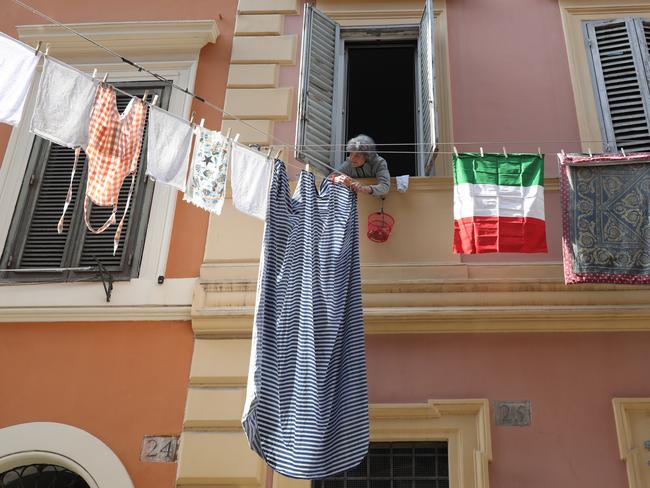
Joggers have also been advised to only stick to running around the block when exercising.
Shoppers are required to wait in socially distanced queues to go to the supermarket as well.
Italian police began mobilising drones on Monday to enforce restrictions on citizens’ movements.
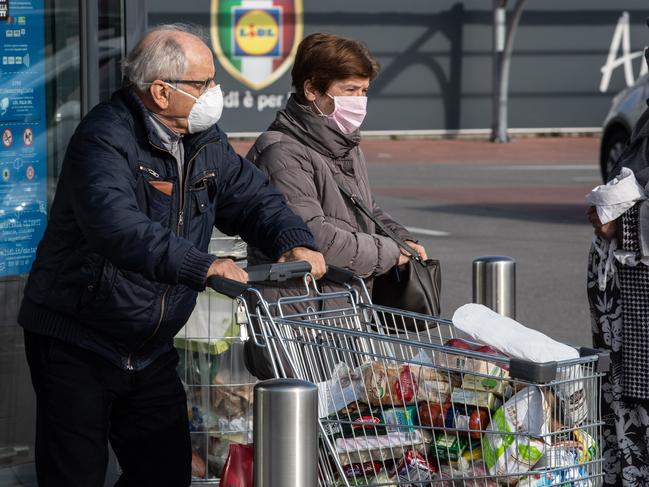
Italian officials said Monday the virus had claimed more than 600 more lives, down from 793 two days earlier.
The outbreak has killed more than 6,000 Italians – the highest death toll of any country outside of China.
UK
The UK has also taken a drastic stance to stop the spread of the coronavirus, with Prime Minister Borris Johnson ordering a three-week national lockdown.
Non-essential shops and services will now be closed, and gatherings of more than two people will be banned.
Mr Johnson on Tuesday said residents should “stay at home”.
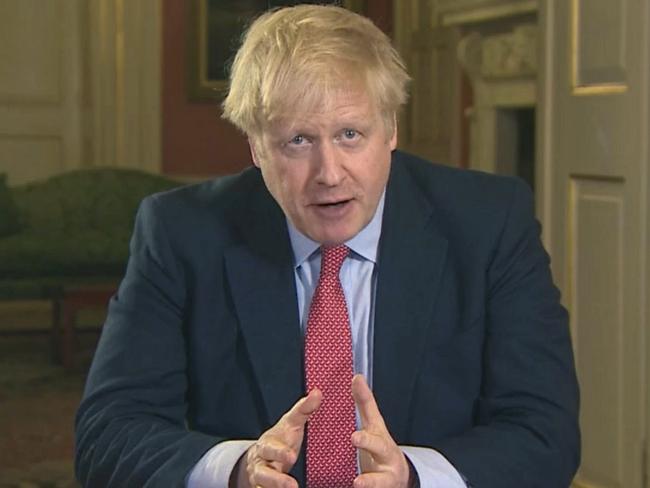
Under the new measures, going out to shop for basic necessities is still allowed, as is exercise, medical needs, and travel to and from work.
However, Mr Johnson said shops selling items such as clothes or electronics as well as libraries, playgrounds and places of worship would be shut, with the ban extending to weddings and baptisms but not funerals.
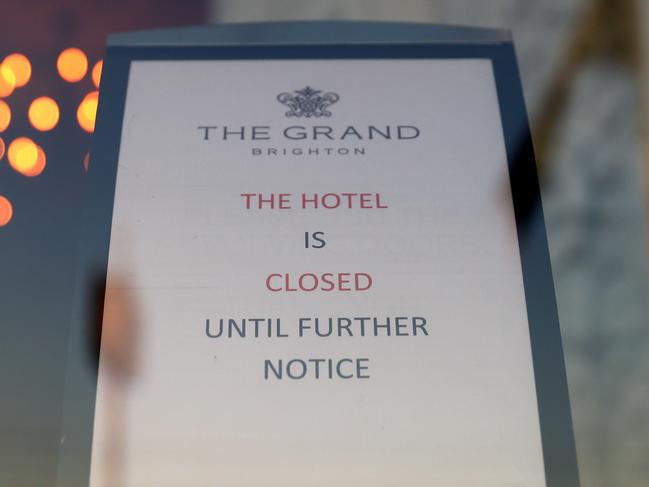
Parks will remain open but Mr Johnson warned: “If you don’t follow the rules the police will have the powers to enforce them, including through fines and dispersing gatherings.”
British justice officials have also put new jury trials on hold as the court system places safety measures in place amid the coronavirus crisis.
All McDonald’s stores in the UK and Ireland will close as well to protect staff and customers from the spread of the coronavirus.
IRELAND
In Ireland, all non-essential businesses have been ordered to shut.
USA
In the US, guidelines were issued by President Donald Trump a week ago to slow the spread of the coronavirus, which curbed unnecessary travel for 15 days.
the Federal Reserve has also unveiled an unprecedented bond-buying programme, in a move not seen since the global financial crisis more than a decade ago.
Treasury Secretary Steven Mnuchin said on Sunday the lockdown affecting large segments of the American public was likely to last 10 to 12 weeks, or until early June.
The White House has recommended limiting gatherings to 10 people.
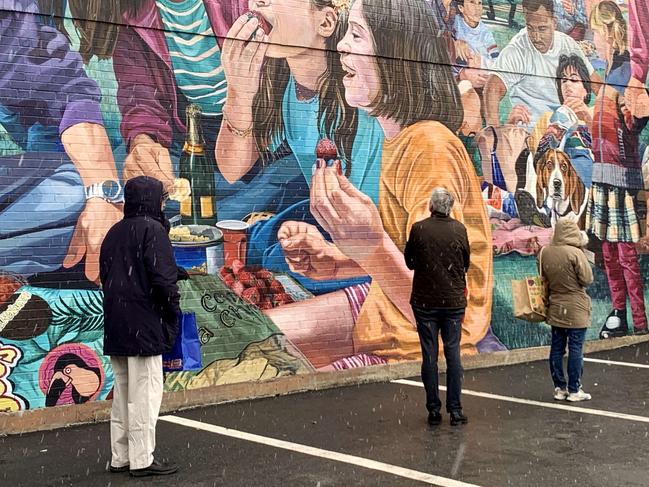
Theme parks, bars, nightclubs and many beaches are also closed in Florida.
Hospital systems in hard-hit areas, including New York and Washington state, have begun postponing elective surgeries as well, as they anticipate a need for more hospital beds for people diagnosed with the virus.
The scramble to marshal public health and political resources has intensified in New York, with a statewide lockdown taking effect amid worries the city of 8.4 million will become one of the world’s biggest hot spots.

On Tuesday it was reported more than 12,000 people had tested positive in the city and almost 100 have died.
The state of Alabama is postponing its scheduled March 31 primary run-off in the Senate race between Jeff Sessions and former Auburn University football coach Tommy Tuberville.
Five other states also have postponed their primaries because of the coronavirus pandemic: Georgia, Kentucky, Louisiana, Maryland and Ohio.
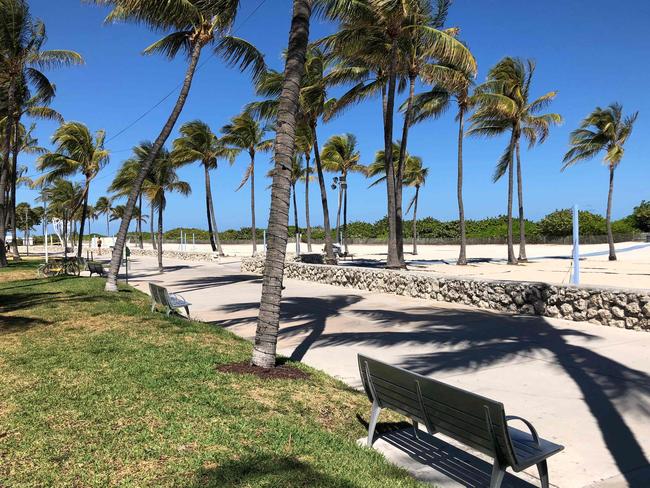
Alabama Governor Kay Ivey issued a state of emergency on March 13 and said all public schools would be closed from March 18 to April 6.
State-run libraries, museums, archives and schools will be closed in the state of Alaska as well, with many other states taking similar but individual and drastic action of their own.
Action in other US states include the closure of bars, restaurants and cinemas; restriction of restaurant and cafe capacities; and calls for residents to stay at home.
CHINA
In China, the city of Wuhan, where the outbreak emerged late last year, is allowing residents limited movement as its lockdown is gradually relaxed. China is now sending plane-loads of protective gear and doctors to Europe.
China imposed a 14-day quarantine for overseas visitors, strict social distancing for anybody in the country, the public monitoring of citizens and punishments for infringements.

China’s quarantine spanned at least 20 provinces and regions at its peak, according to The Wall Street Journal.
Wuhan was locked down on January 23, and for six weeks residents were self-quarantined in their homes.
Residents of Hubei province – the initial epicentre of the disease – who are deemed healthy will now be allowed to travel from midnight under moves to lift restrictions on about 50 million people.
“We are celebrating today,” a female doctor surnamed Wu told AFP.
“The doctors and nurses are becoming more and more relaxed as the days go by. I am super happy!”
The relaxation of rules will not apply to the hardest-hit city of Wuhan until April 8, but China may prove to have turned a corner.
SPAIN
Soldiers in Spain tasked with fighting the outbreak reported finding abandoned elderly people – some dead – at retirement homes.
Younger people have been warned not to visit elderly lowed ones to avoid spreading the virus to the most vulnerable, but “ticking time bombs”.
CHILE
Chile has become the latest country to prevent one – the Dutch-flagged Zaandam with 1,800 people on board – from docking.
Chile is concerned that 42 of those on board with flu symptoms might be carrying COVID-19 coronavirus, but previous experience with a ship off Japan has shown the disease spreads quickly among trapped passengers.
EGYPT
Egypt announced a night-time curfew for two weeks.
CANADA
In Canada, Prime Minister Justin Trudeau says his government is deferring tax payments until August, providing a wage subsidy for small business and pausing student loan payments amid the pandemic amid the coronavirus pandemic.
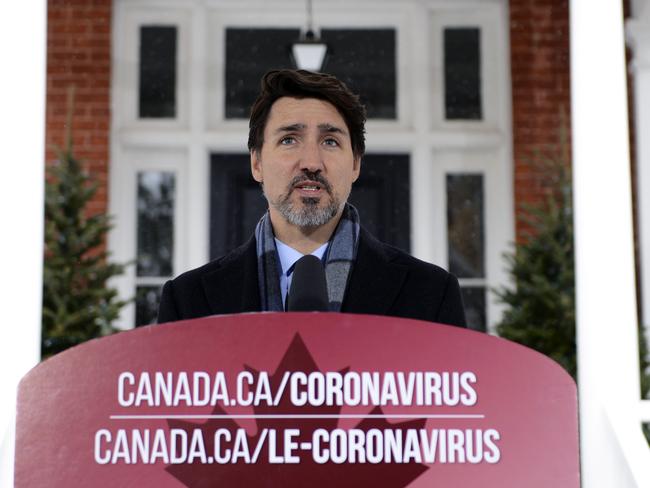
Trudeau says government is focused on making sure Canadians have the money they need to support their families, buy groceries and pay the rent.
Trudeau has also said “enough is enough. Go home and stay home.”
He said staying at home is a duty and the government will enforce it if necessary.
TURKEY
In Turkey, the nation is sealing its land and rail border crossings with Greece and Bulgaria as part of its efforts to contain the new coronavirus outbreak.
Ferry crossings between Turkey and Greece have also been suspended.

Turkey has suspended flights from 20 countries, closed schools and universities and shut down bars, night clubs, cafes, cinemas and gyms among other measures to contain the virus’ spread.
SOUTH AFRICA
In South Africa, Africa’s most industrialised economy and a nation of 57 million people, the nation is going into a nationwide lockdown for 21 days – starting Thursday – to stop the spread of the coronavirus.
South Africa will be the third country in Africa to close down all but essential economic activity after Rwanda and Tunisia.
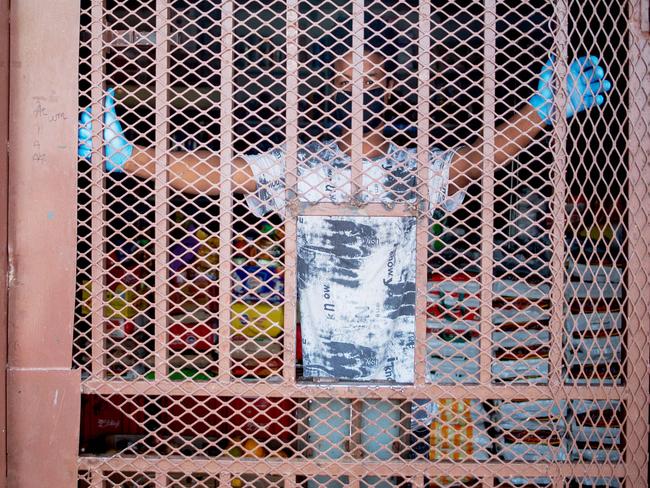
South Africa’s lockdown will be enforced by police and the military, with convoys having already deployed across Johannesburg.
All South Africans will be required to stay home, except for those working in essential services, such as healthcare providers, workers in the security industry and those involved in the production and distribution of food, power and medical products.
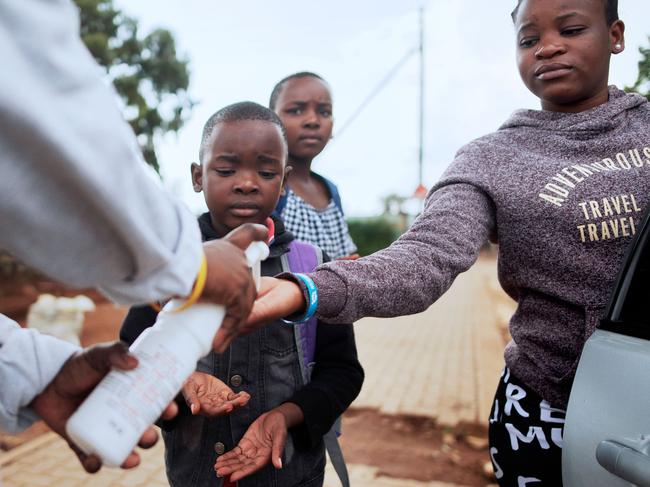
Residents will only be allowed to leave home “under strictly controlled circumstances”, according to President Cyril Ramaphosa, which will enable them to access goods including medical supplies and food.
Banks, supermarkets and gas stations are allowed to continue operations.
AUSTRIA
In Austria,gatherings of more than five people have been banned and people have been told only to go out if necessary.
Universities have been suspended and students aged 15 plus have been told to stay at home.
Borders with Slovakia, Czech Republic, Germany, Hungry, Italy and Slovenia have been closed, and travellers are required to obtain medical clearance before departure.
ALBANIA
Albania is also in a lockdown, with all borders closed, and schools, cafes, restaurants, gyms, and public and private transport shut.
All shops except for groceries and pharmacies are also closed.
Albania has 89 confirmed cases of the coronavirus and a death toll of four.
POLAND
In Poland, Polish police have carried out inspections of nearly 80,000 people subjected to forced quarantine because of the coronavirus pandemic and found 318 cases of people violating the quarantine.
The Polish government has enacted increasingly firm measures in order to slow the spread of COVID-19.
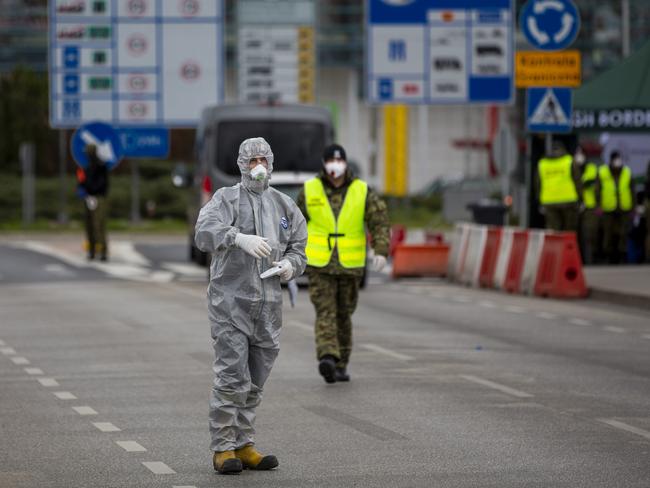
The government last week increased penalties for quarantine noncompliance from 5,000 zlotys ($1,180) to 30,000 zlotys ($7,075).
Authorities extended an initial two-week closure of all schools in the country for an additional two weeks, lasting through Easter.
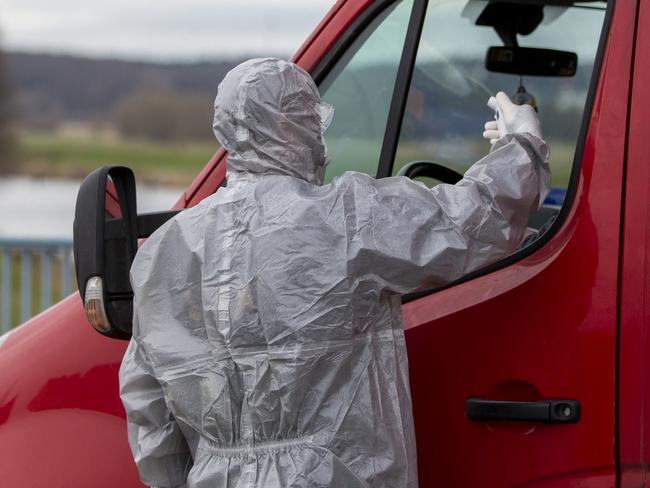
They also introduced a phone app to track those in home quarantine.
With a population of 38 million people, Poland reported it had 649 confirmed cases of the coronavirus and seven deaths on Tuesday.
SRI LANKA
Sri Lanka’s government has also banned non-essential travel across the Indian Ocean island nation, in the latest measure to contain the spreading of the coronavirus.
The government is allowing the transport of rice and other essential items.
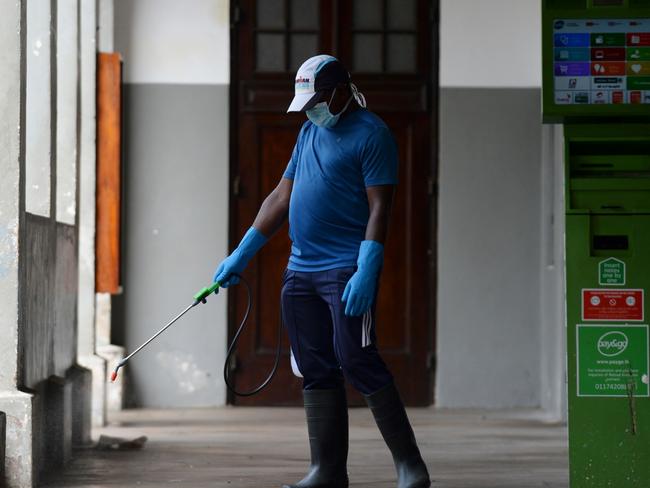
A statement from the president’s office said the government has banned the transporting of tourists, which is a major source of income for the country.
Sri Lanka reported it had confirmed 82 coronavirus cases on Tuesday.
INDONESIA
In Indonesia, President Joko Widodo ruled out the possibility of imposing a lockdown on Jakarta and has instead ordered mass testing to contain the coronavirus disease spread and has prepared about 200 hospitals run by government, military and police as well as private as the country braces for an anticipated surge in coronavirus patients.
The nation reported on Tuesday it had 514 coronavirus cases with 48 deaths, including six doctors and a nurse who died while helping patients with a lack of protective tools.
JAPAN
In Japan, the Tokyo 2020 Olympics has been pushed back to next year.
Japanese Prime Minister Shinzo Abe tried to sound an optimistic note, vowing the delayed sporting extravaganza would be “a testament to mankind’s defeat of the new virus”.
It follows a nationwide announcement on Monday which would require a 14-day quarantine to all visitors from the United States, including Japanese and Americans, effective Thursday and until the end of April.
Japan on Sunday raised a travel advisory for the US, urging the Japanese citizens not to make non-essential trips to the US.
INDIA
India ordered its 1.3 billion people – the world’s second biggest population – to stay at home for all but essential business on Tuesday.
Prime Minister Narendra Modi’s “total lockdown” call doubled the number of people across the globe under some form of movement restriction to slow the spread of the virus to more than 2.6 billion people.
“To save India, to save its every citizen, you, your family … every street, every neighbourhood is being put under lockdown,” Modi said, announcing this would go into effect at midnight, Delhi time.
Mod spoke as the epidemic continued to ravage the global economy and cut a swath through the world’s sporting, cultural and social agenda, forcing the Tokyo 2020 Olympics to be pushed back to next year.
Originally published as Australia could follow in the footsteps of New Zealand, which is currently on lockdown


